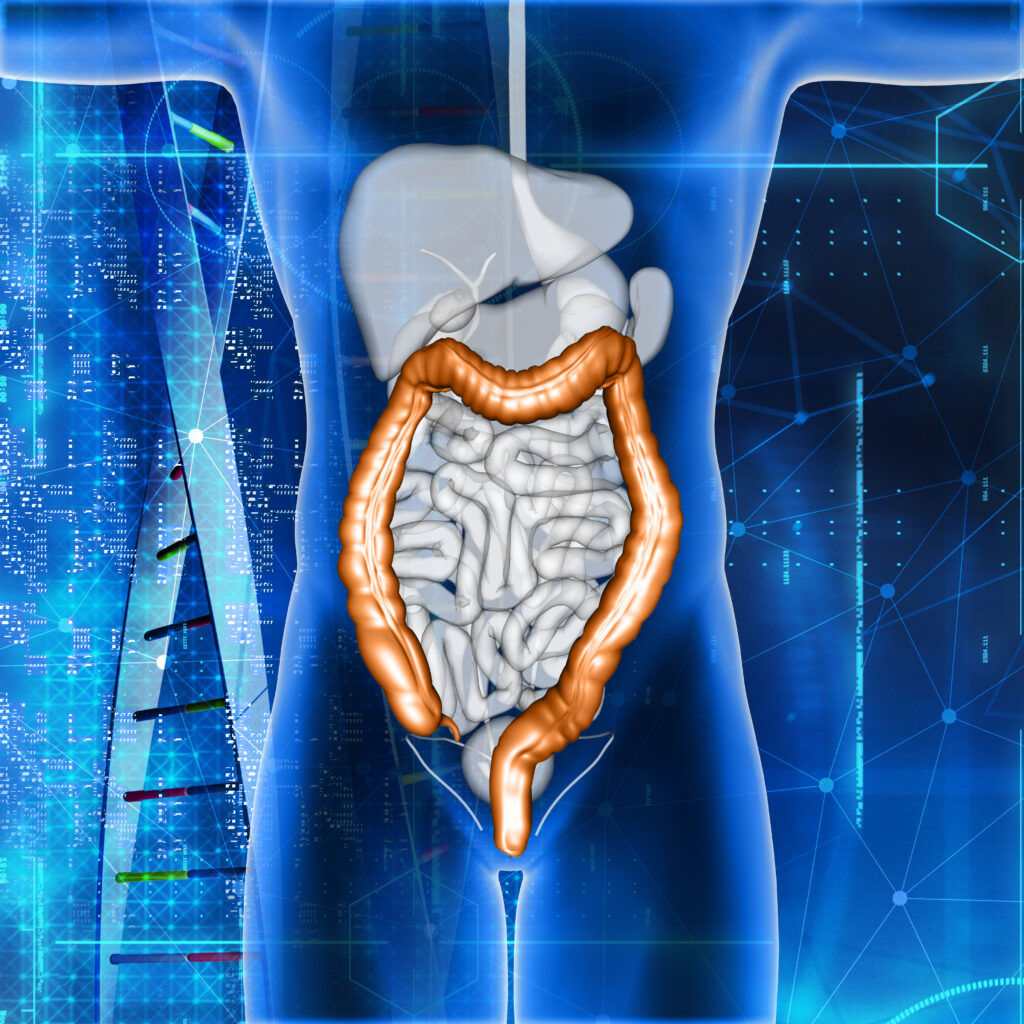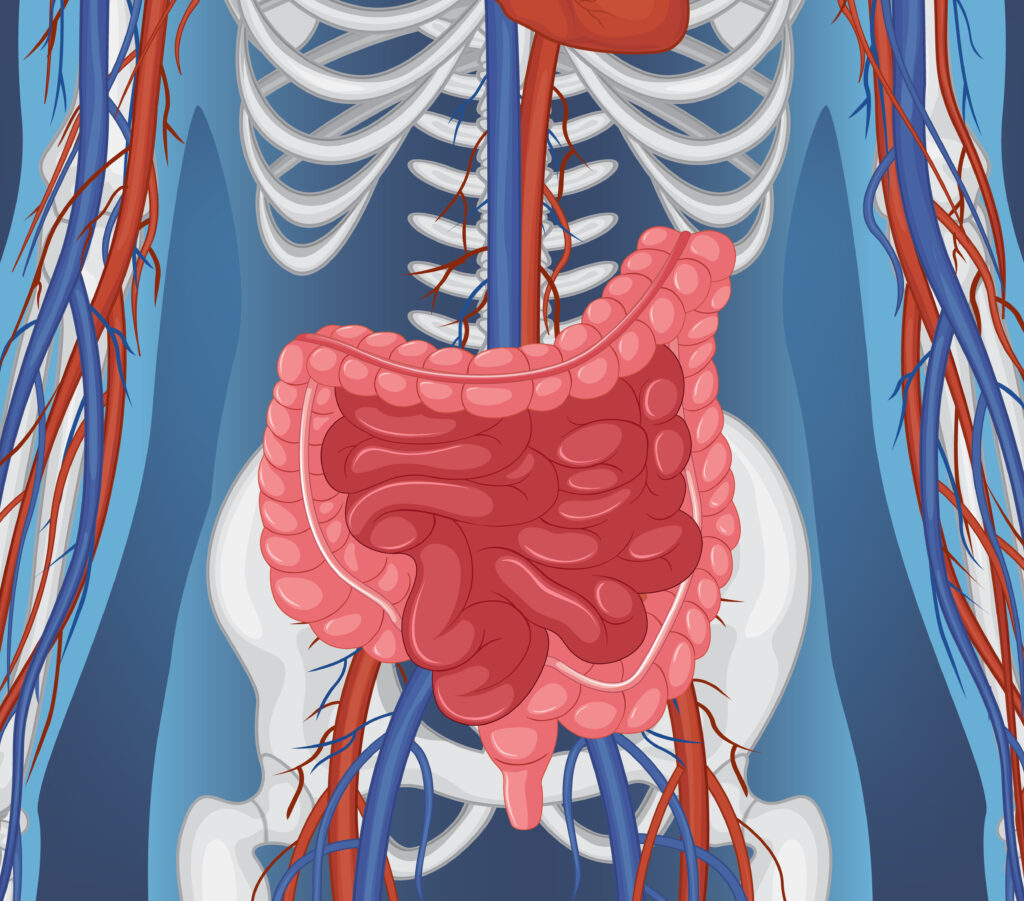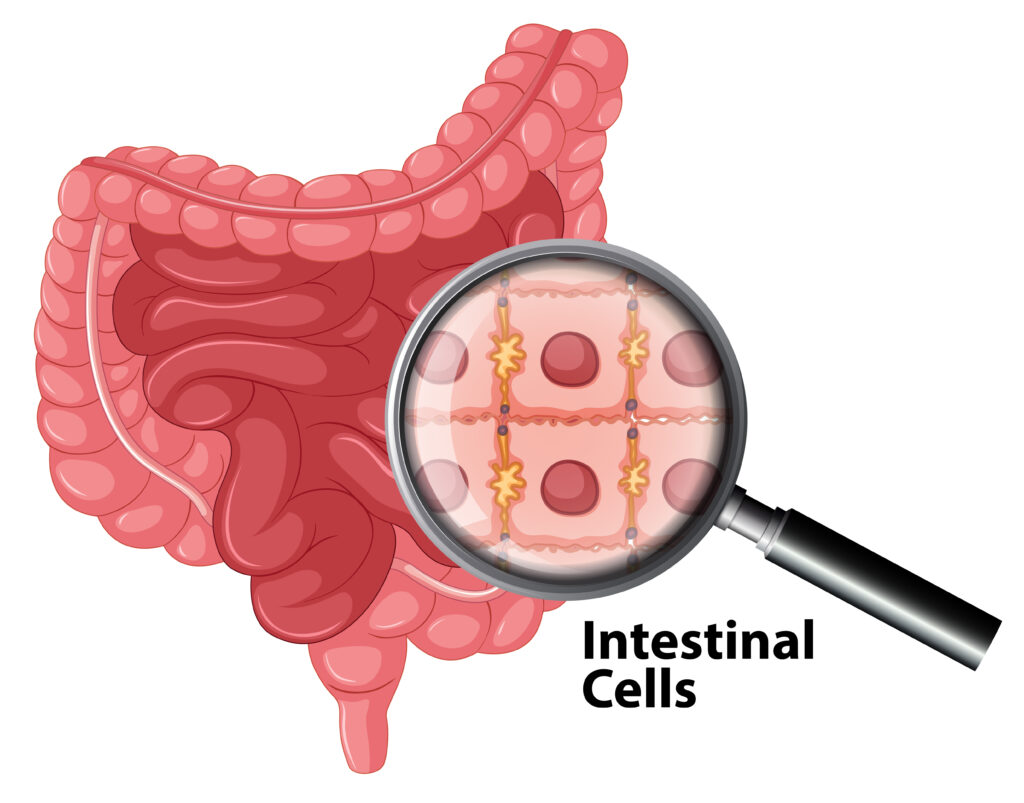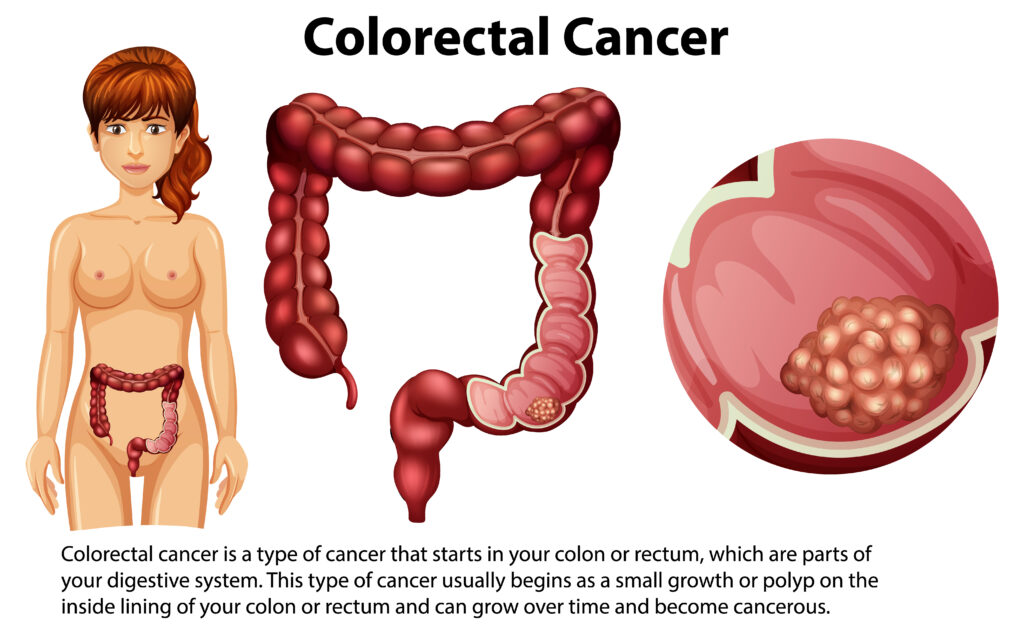What is colorectal cancer
Colorectal cancer, also called bowel cancer, is a type of cancer that starts in the colon or rectum. The colon and rectum are parts of the digestive system, and their main function is to absorb water and nutrients from food and expel waste from the body.
Colorectal cancer usually begins as a growth of tissue called a polyp. Over time, some types of polyps can develop into cancer. The exact cause of colorectal cancer is not known, but it is thought to be influenced by a combination of genetic, environmental, and lifestyle factors.
Colorectal cancer symptoms may include changes in bowel habits, such as diarrhea or constipation, blood in the stool, abdominal pain, unexplained weight loss, and fatigue. However, in the early stages, colorectal cancer may not cause any symptoms, which is why regular checkups are important for early detection.
Colorectal cancer treatment usually involves surgery to remove the cancerous tissue along with chemotherapy, radiation therapy or targeted therapy, depending on the stage and characteristics of the cancer. Early detection and treatment can significantly improve the prognosis for patients with colorectal cancer.

Types of colorectal cancer
.Colorectal cancer can be classified into several types based on various factors such as the location of the cancer cells, histology (cellular appearance), and molecular characteristics.
Adenocarcinoma: This is the most common type of colorectal cancer, accounting for about 95% of cases. Adenocarcinoma arises from cells that line the inner surface of the colon and rectum. They generally form glandular structures and are further classified based on their degree of differentiation and other characteristics.
Carcinoid tumors: These are rare neuroendocrine tumors that can develop in the colon or rectum. Carcinoid tumors arise from neuroendocrine cells and can produce hormones that can cause symptoms such as flushing, diarrhea, and wheezing.
Gastrointestinal stromal tumors (GIST): Although commonly found in the stomach and small intestine, GISTs can also occur in the colon and rectum. These tumors develop from specialized cells in the gastrointestinal tract called interstitial cells of Cajal
Lymphoma: Lymphoma is cancer that develops from lymphocytes, a type of white blood cell. While lymphomas usually affect the lymph nodes, they can also occur in the colon or rectum as primary gastrointestinal lymphoma.
Sarcoma: Sarcoma is a rare cancer that arises from connective tissues such as muscle, fat, or blood vessels. Colorectal sarcomas are uncommon and can include various subtypes such as leiomyosarcoma and angiosarcoma.
Each type of colorectal cancer may have different characteristics, behavior, and treatment approaches. The specific type and stage of cancer are important factors in determining the most appropriate treatment plan.



- Changes in bowel habits, such as diarrhea, constipation, or changes in stool consistency, that persist for more than a few days.
- Blood in the stool, which may appear as bright red blood or dark, tarry stools.
- Rectal bleeding or bloody stools.
- Stomach pain or cramps that don’t go away.
- Persistent abdominal discomfort, including gas, bloating, or fullness.
- Weakness or fatigue.
- Unexplained weight loss.
- Feeling as if the bowels have not been completely emptied after a bowel movement.
- Iron deficiency anemia, which can cause fatigue, weakness, and shortness of breath.
Although these symptoms can occur in both men and women, it is important to note that everyone’s experience with colorectal cancer can be different, and some individuals may not experience any symptoms at all, especially early in the disease. In the early stages of.
Additionally, certain risk factors, such as family history, age, and lifestyle factors, may affect the likelihood of developing colorectal cancer. If you experience any concerning symptoms or have risk factors for colorectal cancer, it is important to consult a health care professional for proper evaluation and testing. Early detection and treatment can significantly improve the outcomes of patients with colorectal cancer.

how to prevent colorectal cancer from our diet
Eat plenty of fruits and vegetables: Aim to eat a variety of colorful fruits and vegetables every day. These foods are rich in vitamins, minerals, fiber, and antioxidants, which may help protect against cancer.
Choose whole grains: Choose whole grains like brown rice, quinoa, whole wheat bread and oats instead of refined grains. Whole grains contain high amounts of fiber and nutrients that may aid digestive health and reduce the risk of cancer.
Limit red and processed meats: Red meats such as beef, pork and lamb, as well as processed meats such as bacon, sausage and deli meats, have been linked to an increased risk of colorectal cancer. Limit your intake of these meats and more often choose lean protein sources like poultry, fish, beans and legumes.
Increase fiber intake: High-fiber foods may help promote regular bowel movements and reduce the risk of colorectal cancer. Include fiber-rich foods like whole grains, fruits, vegetables, beans and legumes in your diet.
Limit alcohol intake: Excessive alcohol consumption increases the risk of colorectal cancer. If you drink alcohol, do so in moderation. Limit your intake to no more than one drink per day for women and two drinks per day for men.
Maintain a healthy weight: Being overweight or obese is a risk factor for colorectal cancer. Aim to maintain a healthy weight through a balanced diet and regular physical activity.
Be mindful of portion sizes: Avoid large portions and practice portion control to maintain a healthy weight and reduce the risk of overeating, which can contribute to obesity and risk of colorectal cancer.
Stay hydrated: Drink plenty of water throughout the day to stay hydrated and aid overall health and digestion.
Limit your intake of sugary and processed foods: Foods containing added sugars, refined carbohydrates and unhealthy fats should be consumed in moderation. These foods can contribute to weight gain and inflammation, which are risk factors for colorectal cancer.
Consider calcium and vitamin D: Some studies suggest that adequate intake of calcium and vitamin D may help reduce the risk of colorectal cancer. Talk to your healthcare provider about whether supplementation may be appropriate for you, especially if you have a poor diet or are at risk.
In addition to these dietary recommendations, it is essential to maintain an overall healthy lifestyle, including regular physical activity, avoiding smoking, and participating in recommended cancer screening tests such as colonoscopy. Always consult a health care professional or registered dietitian for personalized dietary advice based on your individual health needs and risk factors.

colorectal cancer affects mental health
Colorectal cancer can have a significant impact on mental health due to the emotional and psychological challenges associated with the disease.
Anxiety and fear: A diagnosis of colorectal cancer can provoke feelings of anxiety, fear, and uncertainty about the future. Patients may worry about the effectiveness of treatment, possible side effects, prognosis, and the impact of the disease on their daily lives.
Depression: Living with colorectal cancer can lead to feelings of sadness, hopelessness, and depression. Dealing with symptoms, side effects of treatment, changes in appearance or physical function, and disruption of daily routine can contribute to depressive symptoms.
Stress: Managing the physical and emotional demands of colorectal cancer treatment, as well as dealing with financial concerns, work-related issues, and family responsibilities, can be extremely stressful for patients and their loved ones.
Body image problems: Surgery, chemotherapy, radiation therapy, and other treatments for colorectal cancer can cause changes in appearance, such as weight loss or gain, hair loss, or ostomy surgery. These changes can affect body image and self-esteem, causing feelings of embarrassment, shame, or insecurity.
Social isolation: Colorectal cancer treatment and recovery may require patients to spend extended periods of time in the hospital or at home, limiting their ability to participate in social activities and maintain relationships. Feelings of isolation and loneliness can contribute to depression and anxiety.
Relationship strain: Colorectal cancer can cause strain in relationships with family members, friends, and romantic partners due to the stress and emotional turmoil associated with the disease. Communication challenges, role changes, and caregiver burden can further strain relationships.
Survivor guilt: Some colorectal cancer patients may experience survivor guilt, especially if they have lost friends or family members to the disease or if they view their own survival as undeserved or undeserved.
Post-traumatic stress: Colorectal cancer diagnosis and treatment can be traumatic experiences that leave lasting emotional scars. Some patients may develop symptoms of post-traumatic stress disorder (PTSD), such as intrusive thoughts, flashbacks, hypervigilance, and avoidant behavior.
It is important for colorectal cancer patients to prioritize their mental health and seek support from health professionals, counselors, support groups, and loved ones. Early resolution of psychological distress can improve quality of life, treatment adherence, and overall well-being during and after colorectal cancer treatment.

tips for colorectal cancer patient in life
Educate yourself: Learn as much as you can about colorectal cancer, including treatment options, side effects, and self-care strategies. Ask questions and get information from health care professionals, reputable websites, and support organizations.
Build a support network: Surround yourself with supportive friends, family members, and healthcare providers who can provide emotional support, practical help, and encouragement during your cancer journey.
Communicate openly: Be open and honest with your health care team about your symptoms, concerns, and preferences. Effective communication can help to ensure that you receive the best possible care and support tailored to your needs.
Practice self-care: Take care of your physical, emotional, and mental well-being by prioritizing self-care activities like getting enough rest, eating a healthy diet, staying hydrated, engaging in regular exercise, and practicing relaxation techniques like deep breathing.
Manage treatment side effects: Work closely with your health care team to manage and minimize the side effects of colorectal cancer treatment, such as nausea, fatigue, pain, and digestive problems. Don’t be afraid to seek medications, lifestyle changes, or supportive treatments to help ease symptoms.
Follow recommended screening guidelines: Even after treatment is completed, remain proactive about your health by following the recommended screening guidelines for colorectal cancer. Regular screening can help detect any recurrence or new cancer early when it is most treatable.
Find emotional support: Consider joining a support group for colorectal cancer patients or connecting with other individuals who have experienced similar challenges. Sharing experiences, coping strategies, and emotional support can help you feel less alone and more empowered in your cancer journey.
Address financial concerns: Cancer treatment and related expenses can be financially burdensome. Seek help from financial counselors, social workers, or nonprofit organizations that provide financial assistance, insurance guidance, and other support services for cancer patients.
Choose a healthy lifestyle: Focus on maintaining a healthy lifestyle by eating a balanced diet, avoiding tobacco and excessive alcohol consumption, getting regular exercise, and prioritizing stress management. These lifestyle choices can support your overall well-being and increase your body’s ability to cope with cancer and its treatment.
Stay positive and hopeful: While dealing with colorectal cancer can be challenging, try to maintain a positive outlook and focus on the things that are within your control. Celebrate small victories, set realistic goals, and find moments of joy and gratitude in your daily life.
Remember that each person’s cancer journey is unique, and it’s okay to ask for help and support when you need it. Take one day at a time, be kind to yourself, and trust in your resilience and inner strength as you live with colorectal cancer.
conclusion
Colorectal cancer is a significant health concern worldwide, but its impact can be reduced with early detection, appropriate treatment and lifestyle changes. Understanding the risk factors, recognizing the symptoms, and undergoing regular screening are important steps in preventing and detecting colorectal cancer at an early stage when treatment outcomes are most favorable.
In addition, adopting a healthy diet, maintaining a physically active lifestyle, avoiding tobacco and excessive alcohol consumption, and managing stress may contribute to reducing the risk of colorectal cancer and improving overall well-being. For people with colorectal cancer, seeking support from health professionals, family, friends, and support groups is essential to coping with the challenges of diagnosis, treatment, and survival. By staying informed, active, and resilient, individuals can face colorectal cancer with courage and hope, ultimately improving their quality of life and prognosis.
Disclaimer: The information provided here is for educational/awareness purposes only and is not intended to be a substitute for medical treatment by a healthcare professional and should not be relied upon to diagnose or treat any medical condition. The reader should consult a registered medical practitioner to determine the appropriateness of the information and before consuming any medication .health-live.store does not provide any guarantee or warranty (express or implied) regarding the accuracy, adequacy, completeness, legality, reliability or usefulness of the information; and disclaims any liability arising thereof.